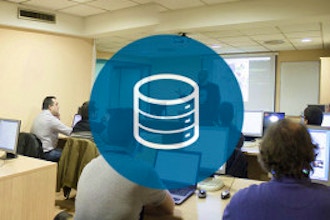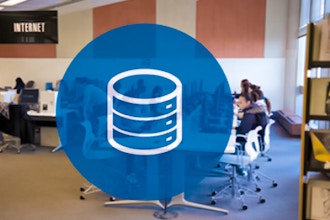Discover the Best Live Online SQL Classes
Data is all around us. We rely on data in business, accounting, finance, and marketing, as well as a range of other fields, to provide insights into customer behavior, financial standing, and operational structure. The data analytics process used to make sense of these data would not be possible without the ability of data professionals to efficiently query huge databases that contain this information. A significant amount of today’s data is currently held in relational databases. SQL, or structured query language, is the tool for retrieving relevant data from a relational database.
Although SQL has traditionally been used by technical professionals like Programmers and Data Analysts, this language is becoming more widely used among non-technical professionals as well, such as those who work in education or data journalism. Because applications like Excel have limitations when handling large datasets, SQL is a go-to for professionals in a range of industries who must quickly process vast datasets and ensure the dataset’s integrity. Learning this popular programming language is easier than many people assume, and it is a skill set that will help you contribute in meaningful ways at work, as well as improve your marketability and earnings potential.
Best Live Online SQL Classes & Schools
One of the most effective and engaging ways to learn SQL is through live online coursework. Participants who study in the live online environment connect with an instructor in real-time who provides instruction and is there to answer questions. The following SQL courses are offered by top educators in the live online format.
NYC Career Centers - SQL Level 1
SQL Level 1, which is available from NYC Career Centers, teaches students a range of basic SQL skills. Participants in this live online class receive instruction about how to work with rows, columns, and tables in datasets. Over the course of this one-day class, those enrolled become familiar with writing SQL queries to extract data for analysis. Participants also receive instruction on working with AND/OR, NOT, WHERE, IN, and SELECT statements to extract information from tables and filter data results. By course completion, learners will be comfortable working with inner JOINs for combining data from various tables. Course content is designed to prepare students to write queries for Microsoft SQL Server. These queries can be applied to other flavors of SQL, such as MySQL, Microsoft Access, and PostgreSQL, with only minor syntax differences.
This course costs $350 and takes approximately six hours to complete. No prerequisites are required for study. Tuition includes the option of a free course retake for up to a year, as well as setup assistance. Learners all receive a verified digital certificate of completion for finishing this class.
BrainStation - Data Analytics Course
BrainStation’s Data Analytics Course is designed for individuals who want to begin a career in data analysis. Those enrolled in this certificate program receive instruction on various data analytics skills, such as how to prepare data for analysis, analyze it, and create visualizations based on data findings. This course begins with a basic introduction to data that details core techniques and concepts. Instruction is provided on a range of skills that help with cleaning and preparing data, reducing bias, and applying statistical analysis concepts to the data analytics process. Participants work with Excel’s basic formulas and advanced functions for data analysis. They also learn about relational databases and how to use MySQL. By course completion, those enrolled will know how to create SQL queries. Learners also work with Tableau to visualize their data findings.
Tuition for this certificate program is $3,250. Coursework can be completed in approximately 30 hours. Students can take this beginner-friendly class on weekdays, weeknights, or weekends.
Noble Desktop - FinTech Bootcamp
If you’re interested in learning SQL to pursue a career in financial technology or data science, Noble Desktop’s FinTech Bootcamp offers hands-on training. This comprehensive program consists of shorter courses, each of which is devoted to a specific tool or skill used in FinTech. Participants complete a Python for Data Science Bootcamp, and SQL Bootcamp, and a Python Machine Learning Bootcamp. Instruction is also offered on using Python data visualization and creating interactive dashboards. Students also can choose between the Python for Finance Bootcamp and the Financial Modeling Bootcamp as a free elective. Instruction is provided on a range of fintech skills, such as using Python to create dashboards, working with machine learning to create statistical models, and accessing Python’s advanced libraries for financial analysis tasks.
The cost of study is $4,995, which can be paid upfront, in installments, as well as through 12-month financing. Tuition includes setup assistance, six, one-on-one mentoring sessions, and the option of a free course retake for up to one year to revisit fintech course material. This program can be completed with four weeks of full-time study on weekdays or part-time coursework on evenings or Saturdays. Although this class is open to learners at all levels who do not have a background working with programming, Python, data science, or data visualization, it is suggested that learners be familiar with stock fundamentals, IRR, NPV, and financial statements. For learners who lack prior training in finance, Noble can provide a free on-demand supplemental guide.
NYC Career Centers - SQL Level 2
SQL Level 2 is offered by NYC Career Centers for those who want to learn intermediate-level SQL techniques. Those enrolled in this hands-on class learn a range of core SQL concepts, such as how to group, filter, and analyze data retrieved from a database. Hands-on training is provided on using aggregate functions for statistical calculations, formatting time and date information, JOINs, and using CAST to alter the data type.
This class is offered as one full-day session and costs $350. As a prerequisite, students should have basic SQL knowledge and be familiar with concepts like working with inner and outer JOINs, writing basic queries, and filtering. Setup assistance is included with tuition, and all learners can retake this class for free for up to a year after completion. Graduates of this class receive a digital certificate. A recording of the class is available to all students in their portal a day after the conclusion of this course. It can be accessed for up to a month.
NYIM Training - SQL Level 1
Beginner-friendly SQL instruction is provided in NYIM Training’s SQL Level 1. This course offers students training in foundational SQL skills. Those enrolled learn about tables, columns, and rows that are contained in a database. Instruction is provided on how to code SQL queries to extract data so it can be analyzed. Students become familiar with writing SELECT statements to choose which columns they want from a table, as well as filtering search results using IN, NOT, AND/OR, and WHERE. Participants also learn how to use inner JOINs to combine the data contained in multiple tables. This course prepares learners to write queries for Microsoft SQL Server. The concepts can also be applied to other SQL flavors, like Microsoft Access and PostgreSQL, with only minor differences in syntax.
The cost of study is $350. Participants can complete this introductory-level virtual course in one full-day session or over two evenings.
New Horizons - SQL Querying Fundamentals - Part 1
SQL Querying Fundamentals - Part 1 is an introductory-level course designed to help students become familiar with SQL basics. Those who sign up for this one-day class study a range of helpful SQL functions and tools. Instruction is provided on how to connect to the SQL database, query it, and modify or save queries. Students learn about conditional searches, data calculations, and how to manipulate string values. Participants receive hands-on training designed to help them rank, sort, filter, group, and summarize data. By course completion, all participants can retrieve data from more than one table, compare and combine two query results, and export query results as a text or XML file.
Tuition is $545. This course takes one full day of study to complete.
Noble Desktop - Data Science Certificate
For those interested in applying their SQL skills to a career in data science or data analytics, Noble Desktop offers hands-on training in its Data Science Certificate. Participants in this beginner-friendly program receive instruction on several core data science skills, programs, and applications. Python programming fundamentals are taught, such as how to analyze data using its most popular science libraries. Learners receive instruction on creating complex database queries, cleaning data, and automating repetitive tasks like updating and aggregating data using Python. By course completion, students will know how to create machine-learning models to solve real-world problems. Core SQL skills are also covered in this class, such as how to use this language to query databases.
Tuition is $3,995 and can be paid in installments or through 12-month financing. The cost of study also provides students with setup assistance, one-on-one mentoring outside of class, and the option of a free class retake for up to a year. This class takes four weeks to complete for full-time weekday study or 20 weeks to finish through part-time coursework on Saturdays and evenings.
Skillspire - Intro to Data Analytics
Skillspire’s Intro to Data Analytics is designed to provide students with the skills needed to become a Junior Data Analyst. In addition to working with SQL, participants use other apps and tools, such as Power BI, Excel, and Python, to understand data quality, analyze, and visualize data. By course completion, students will have a solid grasp of the entire data analytics process and how to use it to handle real-world data problems.
This class provides more than instruction on data analytics; it also prepares students to become data professionals. Those enrolled receive professional development help and assistance with job preparation. Learners receive instruction on building their resumes and techniques for interviewing. This beginner-friendly class is designed for those who are new to data analytics, individuals interested in switching careers, or data professionals who want to improve their skills.
This 12-week, part-time course requires approximately 15 hours/week to complete. Tuition costs $4,499 for those who pay the entire cost upfront. It is $4,999 for those who opt to pay in installments for up to six months. Scholarships are available for qualifying individuals who apply.
Certstaffix Training - SQL Querying - Basic Course
SQL Querying - Basic Course is available through Certstaffix Training. Participants in this introductory-level class are taught to create basic SQL queries that can be used to retrieve specific information from a database. Lessons are provided on core database concepts, as well as how to write SELECT queries. Participants learn to work with built-in expressions and functions, create unions and subqueries, join tables, and execute advanced WHERE clauses. This class is taught with Microsoft SQL Server. Learners working with other versions of SQL, such as MySQL or Oracle, will also benefit from course content.
This class takes two days to complete and is taught in the live online environment. It costs $990. All learners can retake this course for no additional charge for up to six months. A certificate of completion is provided to those who successfully finish this class. The registration for enrollment is two weeks before the start of class.
London Academy of IT - SQL for Beginners
London Academy of IT’s SQL for Beginners is a training course that teaches participants fundamental SQL concepts and skills. Participants receive instruction on how SQL can be used to create a database and its tables. Students learn how to use this language to retrieve database information, filter these data, work with functions and subqueries, create views, and join multiple tables. Learners also receive an introduction to T-SQL.
This course costs£240. It takes eight hours to complete. There are no prerequisites for study, but participants are expected to have basic computing knowledge. Also, familiarity with relational databases is helpful but not required. This class is taught in the live online environment using Zoom. All learners are given a certificate of completion upon finishing this class.
Industries That Use SQL
SQL is a widely used programming language around the world for querying databases. It has applications in a range of industries, from cybersecurity to business to finance. The following sections will take a brief look at SQL’s applications in various industries, as well as how it helps professionals execute a range of data-related tasks.
Cybersecurity
SQL is widely used in the cybersecurity industry because it’s considered to be one of the most effective database languages for promoting security. Without the help of SQL, it would be nearly impossible to protect a database from cyberattacks. This is why most cybersecurity professionals have advanced SQL training. Hackers and Ethical Hackers work with SQL to decide which data to export from a database. They also apply SQL Injections, like SQLdict, to find users’ login information contained in a database.
SQL also plays an integral role in helping cybersecurity professionals detect threats. It can provide insights into network traffic to identify potential threats. By querying log data, these professionals can locate activity patterns that may pose a problem. SQL is a useful tool for investigating any security incidents to determine the source and scope of the threat. Any vulnerabilities in the data can be monitored using SQL, which ensures remediation efforts are in place and prioritized. This language also helps those in cybersecurity monitor security policies regulations’ compliance, and study how malware behaves.
Finance
Financial institutions use highly secured databases to store data. This ensures the information is safe and that it can be easily retrieved when needed. Those who work in finance use SQL queries to retrieve data from databases. Once this information is analyzed, it can help the organization make more sound financial decisions. SQL helps members of financial teams locate trends or historic patterns in sales and revenue. This language also provides insights into important financial KPIs, like net revenue and expense.
Not only does SQL allow Financial Analysts to communicate with databases, but this language also has applications for creating reports that reflect the information in these datasets and how it reflects on the organization’s financial performance. SQL can be used to find data on assets, market trends, and liabilities to provide an accurate assessment of a portfolio’s risk. Risk management professionals rely on SQL to determine the risk of a financial portfolio. Those who work in regulatory compliance use SQL to ensure regulatory compliance is upheld in financial reports. This information can then be used by financial institutions to ensure their reports are error-free and comply with regulatory requirements.
Business Analytics
Business Analysts are involved with gathering data to form business insights and provide recommendations to improve how their organization operates. These professionals try to spot issues in any aspect of an organization, from staff development to IT processes to organizational structures. Business Analysts work with a range of tools to gather these insights. SQL helps them create, manage, and maintain the data held in relational databases. These professionals rely on SQL for data analysis because this language is adaptable and versatile. It allows them to retrieve data simultaneously from more than one table, which helps them answer even complex questions.
SQL has many applications in business. It provides a way to access a range of useful information from databases, such as that pertaining to stocks, orders, customers, or products. This language makes retrieving, organizing, and analyzing these data much easier. It can be used to spot purchasing tendencies among online shoppers. This information can be applied toward additional marketing activities or product promotions. Business professionals use SQL to determine where to place a store based on where it may be most profitable. This language can also be used to retrieve and rank the sales information from chain stores over weeks, months, or years.
Marketing
SQL has many applications in marketing. It helps professionals study customer behavior and segmentation based on factors like demographics, purchase behavior, or website activity. Marketers can then apply this information to more effectively target customers using marketing messages. SQL can also be a valuable tool for determining how effective a specific marketing campaign is, as well as tracking KPIs like conversion rates and click-through rates. This language is useful for performing A/B testing on these campaigns as well. Marketers with SQL training can divide their audience into separate groups to test various campaign iterations to see which will perform the best.
SQL allows Marketing Analysts to study marketing channels. It provides a more robust understanding of user information so crucial metrics can be established, such as customer lifetime value or cost per acquisition. SQL lets these professionals secure detailed user data directly from their company’s databases. Sales Analysts depend on SQL to review data pertaining to sales so they can spot patterns and trends. This information is valuable because it helps them improve sales strategies to reach a larger customer base.
Data Science
Data Scientists regularly use SQL to extract data from large databases, analyze this information, and discover insights. The business data they retrieve from a relational database with the help of SQL allows them to create predictive models. Data Scientists also rely on SQL to query specific data points. This language is useful for data cleansing and pre-processing since it can locate and remove duplicates, null values, and inconsistent data. When working with large datasets, SQL allows data professionals to aggregate tasks like averaging, counting, or summing numbers. Additionally, SQL’s data visualization capabilities are useful for creating graphs and charts based on the data retrieved from a database query. Data Scientists also work with SQL to transform data into the proper format so machine learning algorithms can be applied to the information.
SQL Jobs & Salaries
Because of SQL’s widespread popularity and its use across industries for communicating with relational databases, those with SQL skills have a range of professional opportunities. Some of the largest companies in the world use SQL, such as Apple, Netflix, Amazon, Shopify, and Google. The following sections will explore the role SQL plays in various professions, as well as the salaries these professionals earn based on location.
Quality Assurance Testing
Quality Assurance Testers are responsible for reviewing new software products to spot any potential issues or defects. They work with gaming systems, web apps, and mobile apps to ensure they run as smoothly as possible. Their professional responsibilities entail performing test scripts, studying and analyzing system specifications, evaluating results, and performing comprehensive reporting and documenting. SQL queries help Quality Assurance Testers retrieve any necessary data pertaining to sales for a specific quarter and compare this information to that which is displayed on the application’s interface. This comparison helps Quality Assurance Testers ensure the data is accurate and is displayed clearly. SQL provides an easy way for them to count rows and ensure columns appear as they should.
In the US, the current average pay for a Quality Assurance Tester is $65,000. Those employed in San Diego earn around this average and make a salary of nearly $65,000. Cleveland-based Quality Assurance Testers earn $70,000 annually. Those who work in the greater Seattle area make $80,000 yearly.
Software Engineering
One of the professions in which SQL skills are used most is software engineering. Software Engineers design computer programs and applications that can be used to perform various tasks on computing devices like smartphones or laptops. SQL is considered a fundamental skill for creating data-driven applications. This language helps Software Engineers quickly connect to relational databases to retrieve data. Although in some large organizations, Database Administrators retrieve relational database information, Software Engineers sometimes write SQL queries to include in their application code in order to avoid having to waste time going back and forth with Database Administrators.
Software Engineers with SQL training are often paid higher than those who lack this skill set. Pay rates vary depending on location but are typically high throughout the US. The average pay rate for US-based Software Engineers is nearly $110,000. Software Engineers who work in San Diego make approximately $100,000 a year. In Cleveland, the average yearly salary for a Software Engineer is $115,000. Those working in Seattle earn significantly more and make about $145,000 annually.
Database Administration
Database Administrators are involved with managing database software. These professionals must ensure that data can be successfully stored, organized, and accessed as needed. They often work with a team of SQL Developers and rely on a range of SQL skills to successfully perform their job. Database Administrators evaluate their organization’s data management and security requirements. They then devise processes intended to improve information security and access to the information contained in SQL Server databases. SQL Server Database Administrators use SQL queries to monitor system backups, data replication, and audits so that SQL databases continue to be stable, easy to access, and secure.
Database Administrators are typically paid competitive salaries across the US. The average pay rate is $85,000 a year. Database Administrators who live and work in the San Diego area can expect a yearly salary of approximately $85,000. In Cleveland, these professionals also make about $85,000 a year. The salary for a Database Administrator in Seattle is substantially higher at nearly $105,000.
SQL Server Development
SQL Server Developers create, develop, and oversee SQL databases. Their professional responsibilities involve database management and focusing on any SQL queries that arise. SQL Server Developers are expected to have advanced SQL training and knowledge. Their training with this programming language ensures they can help their organization organize, store, and retrieve any necessary information. The insights contained in the data help their organization make better business decisions.
The average salary of an SQL Developer in the US is currently $95,000. SQL developers living in San Diego can expect to make around $95,000 a year. Those who work in Cleveland also earn approximately $95,000 annually. In Seattle, pay rates are slightly higher, and SQL Developers earn more than $105,000 a year.
Data Science
Data Scientists manage massive datasets and work with data to find important patterns and trends. These individuals are experts at data analysis and apply their skills in a range of industries, such as technology, business, or social science. In addition to skills like machine learning, Data Scientists work with a range of programming languages, such as R, Python, and Excel, to manage data. SQL allows Data Scientists to handle structured data that are stored in relational databases. Without SQL, Data Scientists wouldn’t be able to query these databases to retrieve the necessary information for analysis.
Data Scientists across the US are well-compensated for their SQL skills. The average salary for these professionals is more than $125,000. Those who are employed in data science in San Diego make a yearly salary of approximately $115,000. Cleveland-based Data Scientists earn about $125,000 a year. Data Scientists in the Seattle area make a significantly higher pay rate of $145,000.
Business Analysis
Business Analysts are employed by an organization to analyze its business data. The findings they uncover can be used to offer recommendations that will help the business provide better products, services, software, or processes to customers, as well as to reduce operational costs or improve productivity. Business Analysts use gap analysis to establish the best approach for their organization to use to evolve from its current state into a more sound position in the future. SQL helps these professionals locate gaps in business data pertaining to dates or number sequences.
In the US, the current average salary for a Business Analyst is $80,000. Business Analysts who work in San Diego make in keeping with this average and earn nearly $80,000 yearly. Cleveland-based Business Analysts make close to $85,000 annually. Those who are employed in Seattle earn about $95,000 a year.
Journalism
In the past, Journalists had to spend many hours manually gathering information that they could use in their stories. Now that so much information is online, their professional role has shifted. These professionals still gather information, perform investigations, write stories, and distribute their pieces to the general public. Computer programming languages like SQL now make their data-gathering process much easier.
Although SQL isn’t a requirement for all Journalists, those who know how to use this language to communicate with relational databases are currently in demand because they can perform faster and more accurate data organization, filtering, and analysis. Several of the largest journalistic organizations in the world, such as the National Union of Journalists, use SQL to explore databases and often host events on how to leverage SQL. Because of how popular SQL is becoming in the field of journalism, this language was named one of the “nine essential tools” in data journalism by the International Consortium of Investigative Journalists.
The average pay rate for a Journalist in the US is $70,000. Journalists working in San Diego make around $70,000 a year. Those who are employed in Cleveland also earn $70,000 annually. Seattle-based Journalists make a higher salary of $85,000.



























